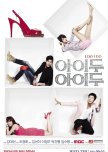Această recenzie poate conține spoilere
Within the aura of a love story some socially critical topics on successful woman, work & family
"I Do I Do" tends to be humorous, offers a nevertheless emotional love story and at the same time the backdrop for the critical processing of a merciless everyday professional and living environment to which women in South Korea are exposed. As also, for example, "Romance is a Bonus Book", "Scent of a Woman", "Revolutionary Love" or "Angry Mom" the KDrama uses the comedic touch to lift the emphasis of the topic into a lighter tone that is easier to digest. Cheerful and serious aspects are well balanced, also thanks to a great cast.
Within the aura of a love story "I Do I Do" comes along with some socially dominant topics around woman, work and family that want to critically be processed. "I Do I Do" precedes "Now, We are Breaking Up" by nine years. Not much has changed in the status of the professional life of a successful woman (in the fashion scene). The scenario reminds here and there: the experienced, successful and talented designer (here elegant pumps) who has chosen career over relationship/marriage/family; the parents who want their daughter to finally get married properly; a younger man who, after a one-night stand, throws the orderly life of the confident businesswoman upside down. In the case of "I Do I Do", the protagonist ends up in a one-night stand, which is rather untypical for her (and him) due to a chain of special circumstances. The hook for further drama is her completely unexpected pregnancy. ... and 37-year-old Hwang Ji-ahn, still being single, having just been medically diagnosed with a premature menopause...
------------------------------- SIDE NOTE: --- Woman, Work and Family as far as South Korean society is concerned ---
- A woman (in South Korea) can perhaps be successful, but the price for this is her woman-ness (as in many places on earth...). She proves herself to be a better man and simply has no room for relationships where she could live out her soft, tender, feminine side. Showing her weakness at work whatsoever would jeopardize her position. Competitors are already waiting for a devastating neckbutt.
- A woman can be excellent and even unique in her work. From a marketing point of view, however, it is more promising (because it is more binding for business partners) if a man bears the official, managerial responsibility for business sucess... because who knows when the woman will leave the professional world behind and take up her role as wife and mother... The dramaturgical dynamics in this regard are astonishingly differentiated in "I Do I Do". There is even room for the aspect of how women envy each others decisions for either way (instead of solidarily supporting each other - here and there).
- A woman should get married. She can mercifully let off steam for a while in her professional life, since society has already become about 10 years more tolerant in 2012 than in the decades/centuries/millennia before. But the age of 37 is (biologically speaking) a magical limit... because now it's high time. (The KDrama actually offers an exceptional man as a role model who thinks progressively here...)
- Dating, a woman automatically becomes the one who needs/wants to be protected and the one who in turn provides the man with allround care. What a mess, if roles lose their clear assignments. Here, too, the KDrama offers, among other things, another (different) exceptional male role model - one who (although instinctively a protector, too, but nevertheless) is ready to develop in a different way.
- And then equally valid for men and women: relationship is not a private matter. At least the parents are the first to have a say.
-Also: The greatest happiness in life should be a permanent position. Everything else is extra...
---------------------------------------------------
"I Do I Do" defies these societal norms, which in South Korea seem to be chiselled in stone. This is no piece of cake. Interestingly, the KDrama offers only one answer to the question "What are the arguments in favor of deciding to have a child or a family as a professionally ambitious woman?" - this in the face of an almost endless list of reasons that argue against it... This single commitment to a "yes" (towards children and family) is located beyond rationality. This "yes" has nothing to do with virtue and values. This one and only "yes" argument is completely personal. (My respect for taking such a position - one that actually stands outside of society´s right to have a say in this!)
After all, "I Do I Do" eventually shows another variation in the Cinderella spirit of fairy tale love stories ... But. I consider the way as the goal! And the path described in this KDrama (the circumstances and processes of the main protagonist) makes it definitely worth seeing. In addition, Kim Sun-ah finds a good balance between a competent, unapproachable boss and an approachable, not so competent 'woman' with her heart in the right place. Lee Jang-woo also convinces me here in his role as the much younger, impulsive, unconventional Park Tae-kang.
By the way: Since it is about the world of fashion designers and pumps in particular, it would be worth mentioning that the viewers get to see a lot in this regard. Not only in Ji-ahn's well-stocked private shoe room, but also beyond that - 500 pairs of pumps were brought up for the series that were supposedly worth almost 9,000 euros. Also, the protagonist Ji-ahn's individual fashionable style (which goes back mainly to Kim Sun-ah's specific, personal suggestions) became a trendsetter at the time.
Considerați utilă această recenzie?


 9
9 39
39 15
15
















